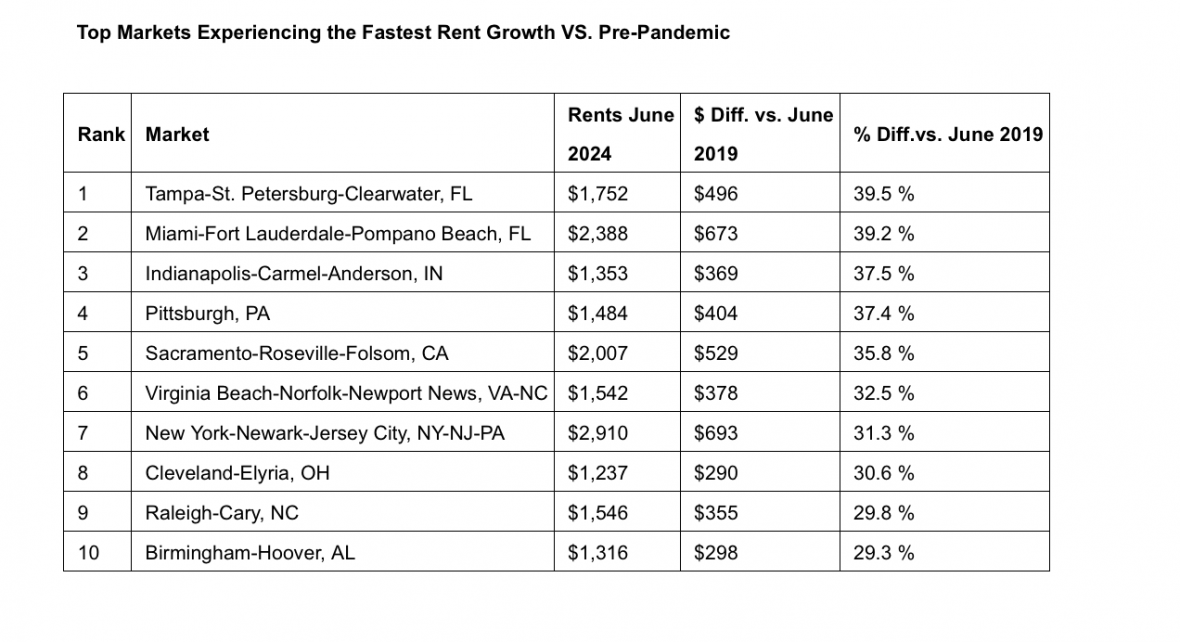
South, Central Fla. Lead Post-Pandemic Rent Surge
Median asking rent across the U.S. fell -0.4% in June, but Tampa and Miami saw the highest percentage increase in rents from June 2019 to June 2024.
SANTA CLARA, Calif. – Rents fell again in June, with especially large declines in the South, where there's been an influx of new rental units, according to a Realtor.com Rental Report. The median asking rent for 0-2 bedroom units fell -0.4% ($7) from last June to $1,743, marking the 11th straight month of declines and -0.6% ($11) below its August 2022 peak. Still, some markets have seen rents surge by as much as 40% compared to 2019's pre-pandemic levels, with Tampa, Fla., seeing the largest increase over the past five years.
The Top 10 markets experiencing the fastest price growth versus pre-pandemic rents include: Tampa-St. Petersburg-Clearwater, Fla. (+39.5%); Miami-Fort Lauderdale-Pompano Beach, Fla. (+39.2%); Indianapolis-Carmel-Anderson, Ind.(+37.5%); Pittsburgh (+37.4%); Sacramento-Roseville-Folsom, Calif. (+35.8%); Virginia Beach-Norfolk-Newport News, Va.-N.C. (+32.5%); New York-Newark-Jersey City, N.Y.-N.J.-Pa. (+31.3%); Cleveland-Elyria, Ohio (+30.6%); Raleigh-Cary, N.C. (29.8%); and Birmingham-Hoover, Ala. (+29.3%).
"Rents have been steadily falling for almost a year, though the pace of the decline has slowed," said Danielle Hale, chief economist at Realtor.com. "But rental costs have risen significantly since before the pandemic and inflation has further strained renters' budgets, underscoring the need for more supply to meet demand and to keep renters from contributing an increasing percentage of their incomes to housing costs."
Tampa saw the highest rent growth since before the pandemic
The median asking rent for 0-2 bedroom units across the top 50 metro areas in June was 21.2% ($305) higher than the same month in 2019, before the pandemic roiled the housing market. That's roughly in line with the trend in overall consumer prices (+22.6%) during the same period, but pales in comparison to the 52.6% increase in median price-per-square-foot of for-sale home listings in the five years ending June 2024.
Half of the 10 markets with the highest percentage increase in rents from June 2019 to June 2024 were in the South, led by Tampa, Fla. (39.5%) and Miami (39.2%). In Tampa, for example, the median asking rent in June was $1,752, or $496 higher than the pre-pandemic level. That is equivalent to about 8.6% of a typical Tampa household's monthly gross income. The biggest increase in the Midwest came in Indianapolis, up 37.5% to $1,353. Pittsburgh saw the largest percentage jump in the Northeast, with the median asking rent rising 37.4% to $1,484, and Sacramento, Calif. led the West, with the median rent climbing by 35.8% to $2,007.
Rents fell in the South, rose in the Midwest, and were mixed on the coasts
Regionally, rental trends were mixed in June. The biggest year-over-year declines were all in the South, led by Austin, Texas (-9.5%), San Antonio (-8.2%), and Nashville, Tenn. (-8.1%). Those areas have seen substantial increases in the supply of new rental units. In the Midwest, rents rose overall, with increases seen in Indianapolis (+4.4%), Milwaukee (+3.7%) and Minneapolis (+3.7%). Large metros in the West saw year-over-year rents decline, including Los Angeles (-1.9%) and San Francisco (-4.2%). Meantime, big coastal cities in the Northeast, such as New York (+0.6%) saw rental rates edge up, albeit more slowly than before.
Units of all sizes saw rents decline
Median asking rents fell across all size categories, with smaller units showing larger declines. The median rent for studios fell by -1.2% on a year-over-year basis, to $1,463. That's -2.0% lower than its October 2022 peak but 17.6% higher than five years ago. Median rent for one-bedroom units fell -1.1% to $1,618, for the 13th consecutive year-over-year decline. That's still 19.5% higher than it was five years ago. And the median rent for two-bedroom units fell by -0.3% to $1,939 for the 12th consecutive month of annual declines, though it was a smaller drop than seen in May. These larger units had the highest growth rate over the past five years, rising by 23%.
© 2024 Florida Realtors®

